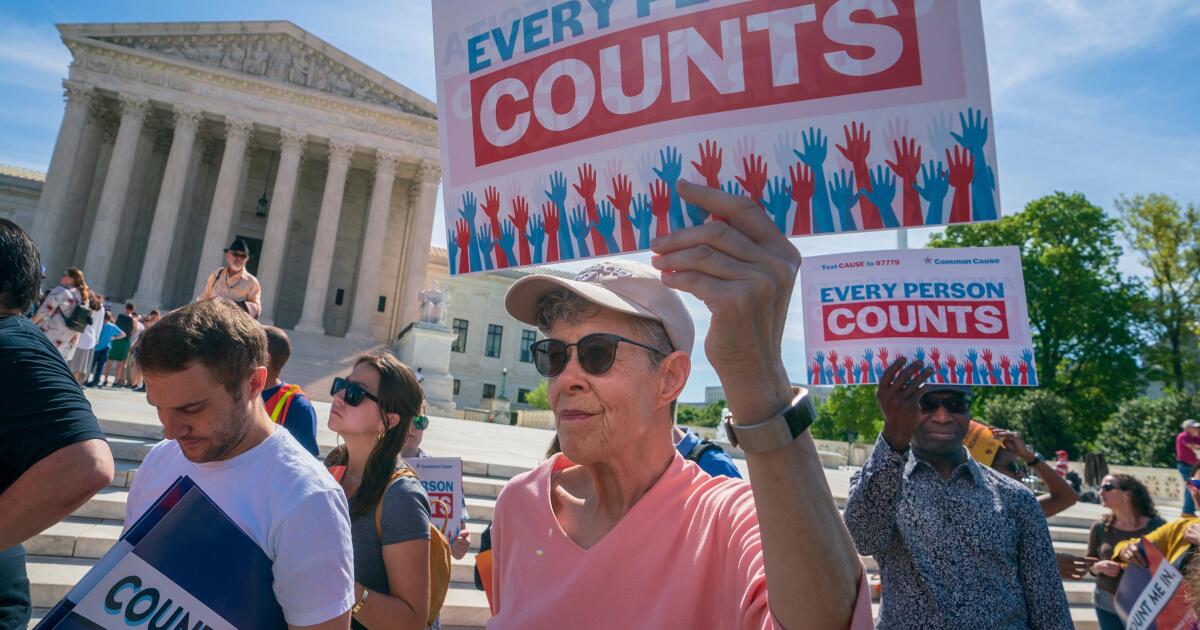Lawsuits by Trump allies could shape how the 2030 census is done and who will be counted
ORLANDO, Fla. — The next U.S. census is four years away, but two lawsuits playing out this year could affect how it will be done and who will be counted.
Allies of President Trump are behind the federal lawsuits challenging various aspects of the once-a-decade count by the U.S. Census Bureau, which is used to determine congressional representation and how much federal aid flows to the states.
The challenges align with parts of Trump’s agenda even as the Republican administration must defend the agency in court.
A Democratic law firm is representing efforts to intervene in both cases because of concerns over whether the U.S. Justice Department will defend the bureau vigorously. There have been no indications so far that government attorneys are doing otherwise, and department lawyers have asked that one of the cases be dismissed.
As the challenges work their way through the courts, the Census Bureau is pushing ahead with its planning for the 2030 count and intends to conduct practice runs in six locations this year.
The legal challenges
America First Legal, co-founded by Stephen Miller, Trump’s deputy chief of staff, is leading one of the lawsuits, filed in Florida. It contests methods the bureau has used to protect participants’ privacy and to ensure that people in group-living facilities such as dorms and nursing homes will be counted.
The lawsuit’s intent is to prevent those methods from being used in the 2030 census and to have 2020 figures revised.
“This case is about stopping illegal methods that undermine equal representation and ensuring the next census complies with the Constitution,” Gene Hamilton, president of America First Legal, said in a statement.
The other lawsuit was filed in federal court in Louisiana by four Republican state attorneys general and the Federation for American Immigration Reform, which opposes illegal immigration and supports reduced legal immigration. The lawsuit seeks to exclude people who are in the United States illegally from being counted in the numbers for redrawing congressional districts.
In both cases, outside groups represented by the Democratic-aligned Elias Law Group have sought to intervene over concerns that the Justice Department would reach friendly settlements with the challengers.
In the Florida case, a judge allowed a retirees’ association and two university students to join the defense as intervenors. Justice Department lawyers have asked that the case be dismissed.
In the Louisiana lawsuit, government lawyers said three League of Women Voters chapters and Santa Clara County in California had not shown any proof that department attorneys would do anything other than robustly defend the Census Bureau. A judge has yet to rule on their request to join the case.
A spokesman for the Elias Law Group, Blake McCarren, referred in an email to its motion to dismiss the Florida case, warning of “a needlessly chaotic and disruptive effect upon the electoral process” if the conservative legal group were to prevail and all 50 states had to redraw their political districts.
Aligning with Trump’s agenda
The goals of the lawsuits, particularly the Louisiana case, align with core parts of Trump’s agenda, although the 2030 census will be conducted under a different president because his second term will end in January 2029.
During his first term, for the 2020 census, Trump tried to prevent those who are in the U.S. illegally from being used in the apportionment numbers, which determine how many congressional representatives and Electoral College votes each state receives. He also sought to have citizenship data collected through administrative records.
A Republican redistricting expert had written that using only the citizen voting-age population, rather than the total population, for the purpose of redrawing congressional and state legislative districts could be advantageous to Republicans and non-Hispanic whites.
Both Trump orders were rescinded when Democratic President Biden arrived at the White House in January 2021, before the 2020 census figures were released by the Census Bureau. The first Trump administration also attempted to add a citizenship question to the 2020 census questionnaire, a move that was blocked by the U.S. Supreme Court.
In August, Trump instructed the U.S. Commerce Department to change the way the Census Bureau collects data, seeking to exclude immigrants who are in the U.S. illegally. Neither officials at the White House nor the Commerce Department, which oversees the Census Bureau, explained what actions were being taken in response to the president’s social media post.
Congressional Republicans have introduced legislation to exclude noncitizens from the apportionment process. That could shrink the head count in both red and blue states because the states with the most people in the U.S. illegally include California, Texas, Florida and New York, according to the Pew Research Center.
The Constitution’s 14th Amendment says “the whole number of persons in each state” should be counted for the numbers used for apportionment. The numbers also guide the distribution of $2.8 trillion in federal dollars to the states for roads, healthcare and other programs.
Defending the Census Bureau
The Louisiana lawsuit was filed at the end of the Biden administration and put on hold in March at the request of the Commerce Department. Justice Department lawyers representing the Cabinet agency said they needed time to consider the position of the new leadership in the second Trump administration. The state attorneys general in December asked for that hold to be lifted.
So far, in the court record, there is nothing to suggest that those government attorneys have done anything to undermine the Census Bureau’s defense in both cases, despite the intervenors’ concerns.
In the Louisiana case, Justice Department lawyers argued against lifting the hold, saying the Census Bureau was in the middle of planning for the 2030 census: “At this stage of such preparations, lifting the stay is not appropriate.”
Schneider writes for the Associated Press.


